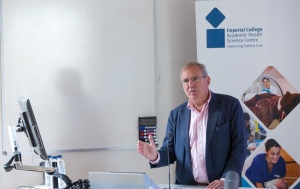Experts explain how big data will help patients, in new seminar series
Big data can bring about big improvements in research and healthcare, according to the speakers at a new seminar series that launched this week
Ian Adcock, Professor of Respiratory Cell & Molecular Biology at Imperial College London, joined Dr Sanjay Gautama, chief clinical information officer at Imperial College Healthcare NHS Trust, for the first Imperial College Academic Health Science Centre (AHSC) seminar on 4 July.
In a packed lecture theatre, Professor Adcock talked about his research in the U-BIOPRED project that is using Europe-wide datasets to investigate severe asthma.
With more than 1000 participants, the research involving Professor Adcock has the largest number of patients in any asthma study and is collecting a vast amount of information including imaging, genetic, clinical and cellular data from blood as well as sputum and breath samples.

Professor Ian Adcock
Professor Adcock described how the analysis demonstrates the existence of several subgroups of asthmatics, each with different symptom profiles who could potentially benefit from different treatments. These types of data will lead to precision medicine and produce a shift in current asthma treatment to more personalised therapies. Professor Adcock and his team are hoping that ultimately clinicians will be able to collect patient data through real-time analysis of breath samples, to inform these precision treatments of the future.
Dr Sanjay Gautama talked about the Care Information Exchange programme, which is an innovative system to allow patients across North West London to access their clinical records and share them with their care teams. A key element of the programme is that the consent to see the data is controlled by the individual patient, placing patients at the centre of how their data is used.
Dr Gautama’s presentation entitled ‘From zero data to big data’ outlined

Dr Sanjay Gautama
how this approach not only provides a patient-focussed way to store and access data, but also a potentially effective means to provide anonymised data to researchers, such as Professor Adcock. The plan is to create a secure data haven at Imperial where NHS data can be analysed, made accessible to researchers, and then fed back into transforming patient care.
The seminar was the first of a new series designed to showcase the work of the Imperial College Academic Health Science Centre, which aims to translate world-leading discovery science into new diagnostics, devices and therapies as quickly as possible, for the benefit of patients and populations worldwide.
Professor Jonathan Weber, Imperial College AHSC Director, who introduced the seminar, said: “This first Imperial College AHSC seminar on big data has provided examples of the AHSC in action and how researchers and clinicians are working together to produce innovative approaches to improve patient care. The two talks gave an excellent insight into how big data can be applied to healthcare in terms of research and access to clinical records, and also how these approaches work synergistically to develop improvements in patient experience and care. We hope the enthusiasm for the seminar series continues with the next event.”
Further Seminars
There will be two more seminars in this first Imperial College seminar series.
The next seminar on healthcare innovations to keep joints working will be held at 13.00, Monday 25 July at Hammersmith hospital, lecture hall 3, Wolfson Education Centre.
The talk will be delivered by Professor Justin Cobb, Chair in Orthopaedic Surgery at Imperial College London, and Alison McGregor, Professor of Musculoskeletal Biodynamics in the Department of Surgery and Cancer at Imperial College London. Professor Cobb will outline how the MSk lab at Charing Cross hospital is developing technologies to assist surgeons and make surgery more effective and cheaper. Professor McGregor will share her work to understand joint health and develop new devices to detect and monitor osteoarthritis. Register for the event.
The third seminar on infectious diseases will be held at 12.30, Tuesday 20 September at St Mary’s Paddington. The speakers will be Neil Ferguson, Professor of Mathematical Biology at Imperial College London and Dr Sarah Fidler, Reader and honorary consultant physician in HIV and GUM at Imperial College Healthcare NHS Trust. For more information contact ahsc.news@imperial.ac.uk
Article text (excluding photos or graphics) © Imperial College London.
Photos and graphics subject to third party copyright used with permission or © Imperial College London.
Reporter
Thomas Angus [Photographer]
Communications Division
Franca Davenport
Communications and Public Affairs
Martin Sayers
Communications Division
